Maggie, a 36-year old homemaker, had always wanted a dachshund for her family.
What kept her from adopting a pet though was her memory of Bruno, the dachshund her family had had while she was growing up.
Bruno, a naughty, cheerful 4-year old, had come down with a severe allergic reaction. His skin grew flaky, hair came off in patches, and he gradually became lethargic and ill-tempered.
The family didn’t have a good veterinarian doctor close by, which meant that the source of Bruno’s allergy was never identified.
Maggie remained fearful that a delicate animal like a dachshund might be difficult to take care of. Was Maggie’s dread founded in truth, or was it completely misplaced?
How prone are dachshunds really to allergies?

Dachshunds are actually a very healthy breed, with hardly any major breed-specific ailments, and can live up to the age of 12 to 14 years with an appropriate diet, regular exercise and proper care.
Of course, like many common dog breeds, they do suffer from allergies once in a while.
The causes of these allergies and the degree of their seriousness can vary depending on a number of factors, but in most cases some basic steps or simple medication from your vet can resolve the problem.
So even though your vet is the right person to treat your dog’s allergies, as an owner it always helps to be aware what the most likely causes, symptoms and treatment methods are.
What Are Allergies?
Allergies are a familiar bugbear for us humans too. These are immune responses to specific substances – called allergens – that can cause discomfort and illness, and can prove serious in rare cases. Continued exposure to allergens might lead to harmful over-reaction as well.
Just as different humans can be allergic to different substances – certain food items, chemicals, pollen, dust, synthetic material – different dachshunds can react differently to the same substance.
For example, if you feed packaged dog food to four dachshunds at your home, it is possible that three out of the four might be perfectly fine with it while the fourth one might have a terrible reaction.
It is your responsibility then to be on the lookout for any seemingly adverse signs shown by your pet, and take it to the vet for a consultation immediately.
Allergies Can Lead to Other Complications
We will talk about some of the more common causes and symptoms of allergies in dachshunds in a while, but it is also important to realize that allergic reactions, while a problem on their own, can be conduits for more serious problems in your dog.
A common ailment in dachshunds is yeast infection, caused by an organism called Malasezzia pachydermatis.
Allergic skin issues such as allergy to food, fleas, pollen and grasses render your dog susceptible to infection by malasezzia.
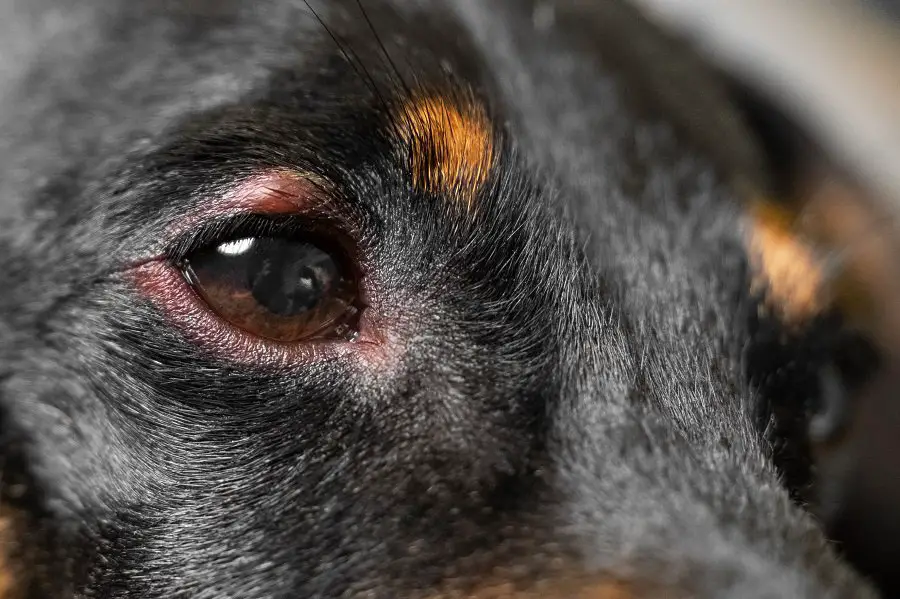
Allergic hypersensitivities are also one of the more common causes of seborrhea, a skin disorder that results in excessively greasy or dry skin and causes a typical ‘doggy smell’ in dachshunds.
Chronic allergies can result in inflammation of the eyelids and tissue around the eye, lowering tear production, resulting in a condition called dry eye.
Problems associated with dry eye include secretion of yellow-green mucus from the eye, redness, cloudiness of the cornea, corneal ulcers, corneal scarring and bacterial infection, all of which are serious complications.
Thus, it becomes imperative to get your dear dachshund’s allergy treated right away, and ensure that it does not balloon into a bigger problem.
Causes of allergies
The most important thing to remember when identifying causes of allergic reactions is that anything can act as an allergen, even though there are some usual suspects.
Hypersensitivity to a substance is genetic in nature, and while many dogs can outgrow it as their immune system becomes stronger with age, it can continue over their lifetime in some cases too.
In other cases, as the dog grows older, the sensitivity can get worse and the reactions can get more severe.
Corn, wheat, rice, soy and specific animal proteins (meat, dairy) are the most common culprits.
Dachshunds have a particularly difficult time digesting corn, and allergic reactions can manifest as physiological or behavioral problems.
Corn is a fairly common ingredient in packaged dog food, so you should check the ingredients on the package label for corn if you find that your dachshund is showing adverse reactions to it.
Some dachshunds are allergic to chicken, so ensuring that their food does not have any poultry in it should be good enough.
Processed food includes food coloring, additives and preservatives. Many dogs tend to be allergic to these substances as well.
Other food-related allergens can be oil, sweets and red vegetables, especially carrots.
Flea and Other Insects
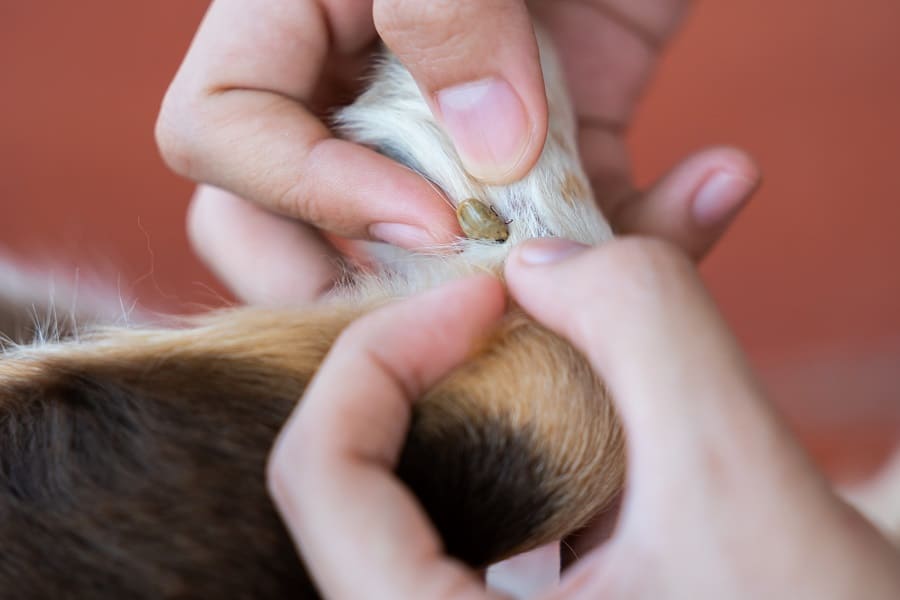
When a flea bites a dog, it deposits a small amount of saliva on the skin.
A dachshund can develop a condition known as flea allergy dermatitis (FAD) in reaction to this saliva, which results in severe itching, scratching, excessive biting around the tail and groin, and scabs and bumps on the neck and back.
Dust mites and insect stings can also cause allergic reactions.
Pollen, Plants and Mold

Dachshunds are one of the breeds that are more disposed to allergy from pollen.
This is generally a seasonal issue, but can be serious, especially considering that dachshunds have the tendency to set out on their treasure-seeking trips out in the open.
Unlike humans, the reaction in the case of dachshunds is not respiratory, but involves skin irritation or inflammation.
This is similar to reactions to other allergens, so it might be difficult to identify initially.
Some plants, trees, grass and mold spores are also known to cause allergy, but are less common.
Dander
Believe it or not, dachshunds, like a number of other breeds, can have allergic reactions to animal fur too!
If you have a number of pets at your home, this is a problem you need to keep an eye out for.
Dust and Smoke
This has become a more pertinent issue in our present times. The high concentration of dust and smoke in air these days can be trying for some dachshunds.
Prescription Drugs
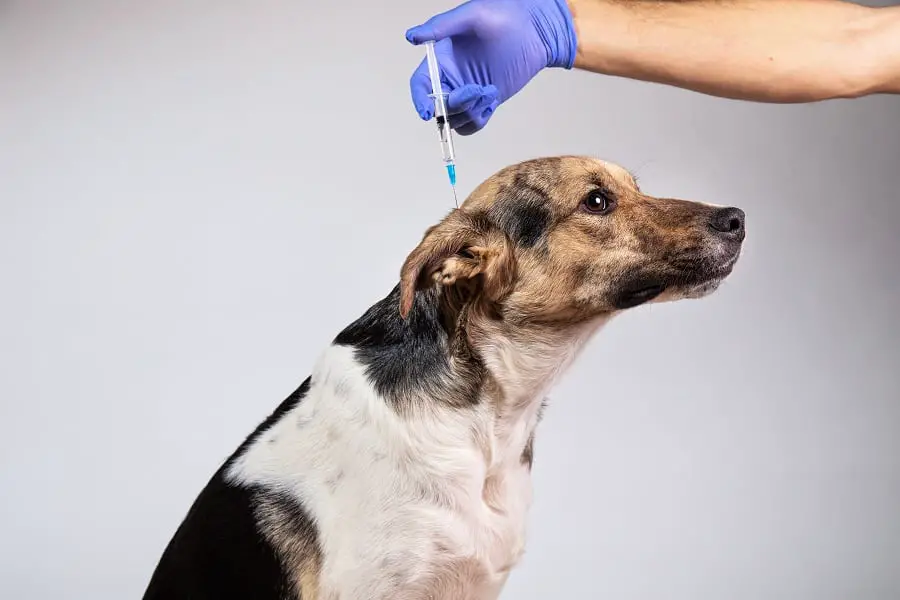
Just like human medicine, a variety of chemicals go into the preparation of veterinary medicine, any one or more of which can act as allergens for your dachshund.
Vaccinations, which all of us rely on to prevent common ailments in our pets, can sometimes end up having adverse reactions themselves.
This could include a rash, loss of fur or swelling at the vaccination site.
One of the most common vaccines that dachshunds have been seen to be allergic to is the Leptospirosis vaccine, though safer versions are being used now.
Chemical Agents
Dog shampoo, household cleaning products, detergents, certain fabrics, plastic, perfumes, some or all of these can be sources of misery for your dachshund.
Any contact with them causes an overstimulation of the immune system, resulting in a painful reaction.
Symptoms
Allergic reactions can manifest in your dachshund in a number of ways.
What makes the cause difficult to decipher is that reactions to different substances can have identical symptoms, and these symptoms can also be similar to those of other illnesses.
So, instead of trying your own treatment, as soon as you notice the persistence of any of these symptoms, you should consult a vet to get to the root cause.
The more common symptoms associated with allergic reactions in dachshunds are:
Itchiness and Skin Irritation
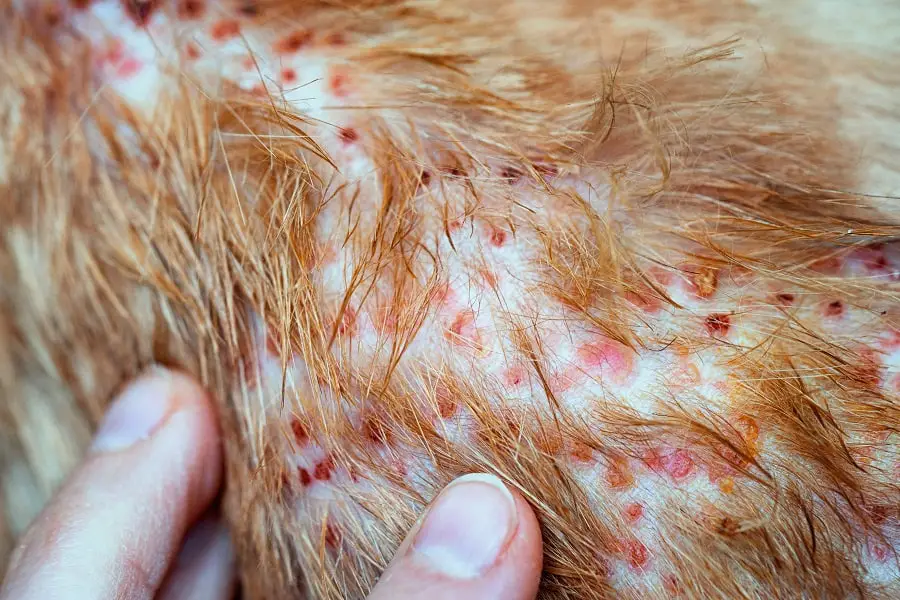
This is by far the most common way that allergies show up in your dog.
If not treated, it can lead to complications like scabbing, hot spots, recurring skin infections, and more.
Causes can include seasonal pollen, FAD and chemical agents.
Non seasonal itching, along with reddened skin and pustules over the rump, abdomen and back of legs is often caused by food allergies.
Paw Licking or Chewing

This is a common sign of disease in dogs, even though many owners tend to ignore it as natural behavior.
Inhalant allergy or a topic dermatitis, which is similar to hay fever in humans, is the most common cause of paw licking.
Flea allergy or exposure to allergens like chemicals, soap and shampoo can also cause a dog to lick or bite its paws to relieve itself of irritation.
Constant licking can cause swelling of the feet and accumulation of debris, with the moist, warm environment being perfect for penetration of organisms that perpetuate the itching cycle.
Other symptoms to be aware of:
-Redness or skin rashes
-Dry skin
-Hair loss
-Vomiting
-Diarrhea or gassiness
-Appetite loss
-Difficulty in breathing, coughing or sneezing
-Ear infection, including redness of the inner part and unusual discharge
-Puffy or runny eyes
-Swelling of the face
-Swelling of the joints
Apart from these common allergic symptoms, extreme reaction to an allergen, known as anaphylaxis, is also possible in rare cases.
Symptoms of this can include shock, difficulty in breathing, vomiting, urination and trouble in controlling bowel movement.
The onset of anaphylaxis is quick, within a very short time of exposure to the allergen.
Diagnosis
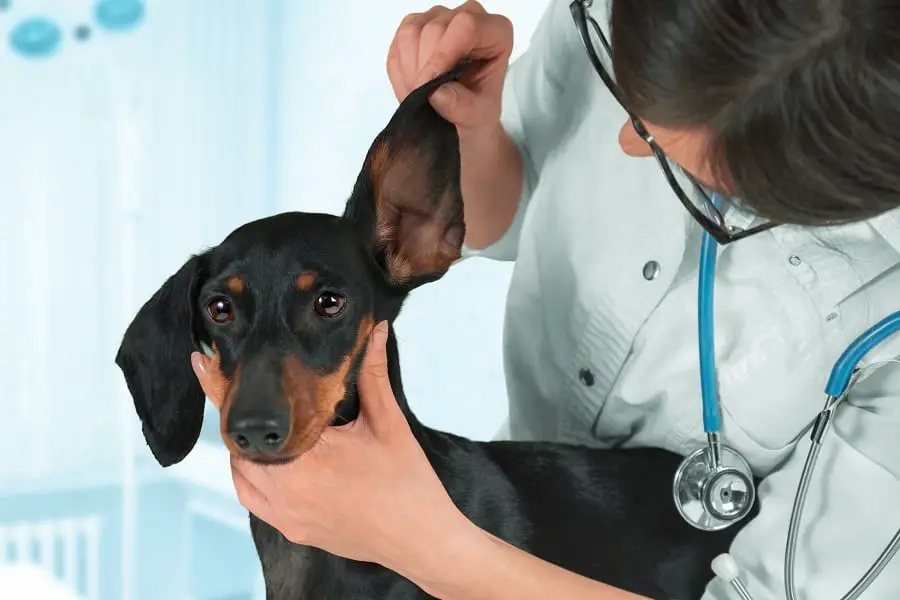
On persistence of symptoms of allergic reactions in your dachshund, it is advisable to take it to a recognized vet.
The vet will give your dachshund an exam which will include a lot of questions about your dog’s diet and environmental factors.
In many cases, especially if it is a skin or ear allergy, the causes can be determined in this first visit through visual inspection.
You might be referred to a veterinary dermatologist if there is a skin problem involved.
The process here will involve an allergy or blood test to identify the allergens, which, in turn, is helpful in decreasing exposure.
Other typical diagnostic methods used in case of allergies are thyroid testing, cytology (which involves examining smears of the skin and nail beds under a microscope for infection-causing agents) and skin scrapings with microscopic examination to rule out mites.
Depending on cytology and biopsy results, and the efficacy of antibiotics, bacterial cultures may be needed.
This helps in determining which antibiotics are likely to give the best results, and is particularly important in chronic cases where long-term treatment is needed.
Dietary trials with hypoallergenic diets are used to diagnose food allergies.
This is followed by trial courses of medications, with different combinations tried out to find the best drug or collection of drugs that is effective.
While all this is done by the vet, you should be aware of the process involved to prepare yourself.
More importantly, since your dog is going to be apprehensive with all the new people a
round it and the probing and prodding it is subjected to, you need to be around (of course, without interfering with the medical procedures) to reassure it that everything’s all right.
Treatment
When we use the word ‘treatment’ in the context of allergies, we don’t mean that the hypersensitivity of the dachshund to an allergen can be completely removed.
What the word means is that the symptoms can be treated to provide the dog with comfort and exposure to the substance(s) it is allergic to is/are removed.
Treatment for allergies can range from simple precautionary steps that owners can (and should) take on their own to medication in extreme cases.
Steps that you can take once a likely source of allergy is identified, and depending on the cause, include:
Keep the dog from walking on grass or from going near plants, especially in case of seasonal allergies.
Wipe off your dog’s paws after walks, if possible, using pet allergen-blocker wipes. If using antibacterial or anti fungal shampoo for washing, ensure that the feet are scrubbed dry.
Bathe your dog using hypoallergenic shampoos that can be bought over the counter and typically contain soothing natural ingredients like aloe and evening primrose oil.
For dry skin, add a small amount of cooking oil to the dog’s food.
Perfect the flea protection regime for your dog – use special anti-flea soaps, use a flea comb, clean the fur regularly.
Dachshunds have long ears that need special care – cleaning thoroughly and regularly using q-tips and mineral oil keeps debris from building up.
Include supplements like biotin or omega-3s in your dog’s diet, which can help suppress itching and improve coat health. Incorporating fish oil or adding freshly milled flax seed can help.
Probiotics are readily and cheaply available these days, and can help strengthen your dog’s immune system.
In consultation with your vet, switch to a limited ingredient diet.
For more serious cases, your vet might opt for one or more of the following remedies:
Drugs like antihistamines and corticosteroids are commonly prescribed for seasonal and environmental allergies.
But long term reliance on steroids should be discouraged. Prednisone is the most common steroid prescribed for dogs.
Genesis, a formulation containing a medicine related to Prednisone, also reduces allergic symptoms and side effects occur less frequently with it.
Cyclosporine A (modified), also known as Atopica, is beneficial in some cases of allergy. It is more expensive than Prednisone, but has fewer side effects.
Medicated shampoos that are not available over the counter may be prescribed to treat secondary sores and infections.
Hyposensitization therapy, which involves a series of allergy shots, is given to help desensitize the immune system.
Hypothyroidism can contribute to many allergic conditions, and the vet might take steps to cure this condition first.
Follow up
The effectiveness of allergy treatments is measured by a reduction in symptoms.
If there is no visible relief, the cause could have been misdiagnosed, and you need to patiently work out the reasons with your vet.
Allergies are generally long term, chronic problems and ask for sustained care from you for your pets.
In other cases, they are cyclical, and you need to be more careful in seasons when your dog is prone to a reaction.
A bit of extra caution from your end can ensure that your dachshund stays healthy and happy.
